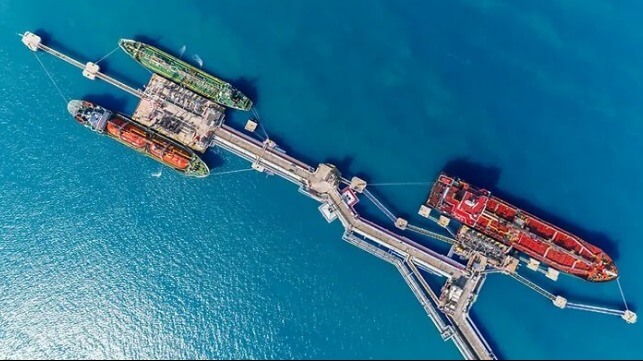Lloyd’s Register to Study LCO2 Offloading After Shipboard Capture

The Singapore-based Global Centre for Maritime Decarbonisation (GCMD) announced the launch of its latest sponsored study with this element focusing on the offloading of liquified CO2 after it has been captured during the operation of a vessel. The center is a non-profit partnership launched to aid in the industry’s decarbonization transition by helping to shape standards, develop solutions, and foster collaboration by sponsoring studies addressing elements needed for decarbonization.
While shipboard carbon capture is an emerging technology that the center projects as a mid-term solution for decarbonization, they highlight there are currently no guidelines for how to offload and handle captured CO2. They point out that it is most likely to take a liquified form to aid in the storage and offloading, but that while the capture technology is being developed, the value chain is yet to be explored and specifically the offloading and shore storage.
“Through this concept study, GCMD will help support the establishment of regulatory and operational guidelines and help set a precedence for future piloting and demonstration projects related to shipboard carbon capture technologies at scale,” they write announcing the awarding of the project. “With both the Maritime and Port Authority of Singapore and the Port of Rotterdam Authority as observers on this study, the findings can help assess the prospects of LCO2 to support maritime decarbonization.”
The center launched its requests for proposals to conduct the study in December 2022 inviting a shortlist of classification societies and engineering consultants to submit proposals. They report that a total of six proposals were received. After an internal review and evaluation by three external experts with extensive domain expertise, Lloyd’s Register, supported by their partner Arup, was awarded the assignment for the concept study. The study will start in April 2023 and is expected to be completed within nine months. More than two dozen partner organizations from across the shipping industry working with the center will also participate in the project.
“Conducting this concept study for the Global Centre for Maritime Decarbonisation will deliver greater industry understanding around the safety and operational issues that need addressing for offloading captured LCO2 from vessels,” said Nick Brown, CEO of Lloyd’s Register. “This study, in collaboration with stakeholders from across the maritime value chain, will support the establishment of regulatory and operational guidelines around offloading captured liquid carbon dioxide from vessels, which is crucial to enabling safe adoption of carbon capture technologies on board. It will also offer a timely assessment of the capital expenditure and operating expenditure of the infrastructure needed to offload liquid carbon dioxide from ships thus enabling the industry to make informed decisions for creating this infrastructure.”
GCMD identified key areas for the study. It is to address safety and operational considerations for the offloading from either tankers, bulkers to containerships, considering that the vessels will likely be alongside and also conducting concurrent cargo and bunkering operations. They raise considerations including the temperature and pressure required for the optimal offloading, considerations for storage receptacles, and storage conditions.
A broader intent of this concept study is to also assess the readiness of the current infrastructure for LCO2 offloading. They will develop CAPEX and OPEX models for LCO2 offloading infrastructure buildout and operation costs and look to share the results with industry stakeholders, such as port and terminal operators, vessel owners, and shipyards.
This study is also a prerequisite to a large study planned by GCMD that aims to conduct a 500-hour pilot of shipboard carbon capture and offloading after 10 days of sailing. The findings from the LCO2 offloading study will form a basis to enable the sea trials in Phase 3 of Project REMARCCABLE, which aims to demonstrate a 30 percent annual CO2 emissions reduction or 1300 kg/hr of CO2, store 375 metric tons of LCO2 onboard, and offload LCO2. The first phase of this project was focusing on design engineering for a carbon capture system. The sea trials are planned to take place aboard the MR tanker Stena Impero (50,000 dwt). Last month, the American Bureau of Shipping (ABS) approved the design concepts for the sea trials aboard the tanker.
GCMD is also working on two other separate study projects. One focuses on ammonia bunkering. The other study which is underway is setting the standards and validation of biofuel drop-ins.
No comments:
Post a Comment